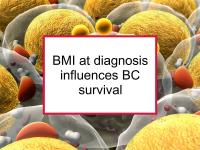A new study has reported that women who are underweight or morbidly obese at breast cancer diagnosis are at higher risk of death from all causes. Morbidly obese women are also at increased risk of breast cancer-specific death. The study was designed to investigate the influence of body size on survival after a diagnosis of breast cancer.
Both obese and underweight women have been reported to have worse survival than normal weight women who develop breast cancer. However, the optimal body mass index (BMI) range for prognosis has not been established. The study included 14,948 patients in the After Breast Cancer Pooling Project who were diagnosed with stage I to stage III breast cancer between 1990 and 2006.
The women were divided into the following World Health Organization weight categories at diagnosis: underweight (BMI < 18.5 kg/m(2)); normal weight (18.5 to < 25); overweight (25 to < 30); obese (30 to < 35 kg/m(2)); severely obese (35 to < 40 kg/m(2)); and morbidly obese (≥40 kg/m(2)). Participants were followed for an average of 7.8 years for breast cancer recurrence and mortality.
A total of 2,140 deaths and 2,065 breast cancer recurrences took place during the follow-up period. Underweight women were 1.6 times more likely to die (i.e., from all causes, not just breast cancer) and morbidly obese women were 1.8 times more likely to die than normal weight women. Morbidly obese women were also at increased risk of breast cancer-specific death. Obese and severely obese women were found to have small increases (~10%) in risk of death compared to normal weight women, but these increases were not statistically significant.
Overweight women did not experience any increased risk of death compared to normal weight women. The authors conclude that the study results suggest that degree of obesity influences survival.
Body weight matters less for triple negative breast cancer
Previous studies have also suggested that being merely overweight does not unduly worsen breast cancer prognosis. The study size was large enough to demonstrate convincingly that even some degree of obesity is not very harmful (assuming appropriate breast cancer treatment). Based on this and other studies, we think that overweight and obese breast cancer patients are better off improving their diets and increasing their level of physical activity than focusing primarily on weight loss.
Weight loss would be inevitable for those closely following an eating plan based on the information in this website. A good start would be to eliminate or reduce consumption of the foods on our avoid list and start consuming more foods on our recommended list.
Both chemotherapy and endocrine treatment (particularly aromatase inhibitors) appear to be less effective after 10 or more years for women with BMI greater than 30 kg/m(2).
In other words, the effects of adjuvant therapy appear to be lost more rapidly in obese breast cancer patients.
